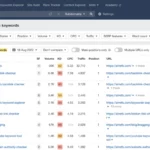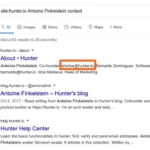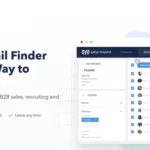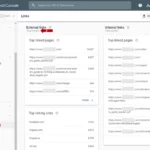There could be several reasons for this. One possibility is that the keyword you are searching for has very low search volume, and Google Keyword Planner may not have enough data to provide an accurate estimate. Additionally, if the keyword is too specific or niche, there may not be enough search volume for it to be displayed.
Why is Google Keyword Planner Not Showing Search Volume?

There can be several reasons why Google Keyword Planner is not showing search volume. One possible reason is that the cache and cookies on your browser may be causing issues. Clearing them can help resolve this problem. Another reason could be that your Keyword Planner is not up to date. Updating it to the latest version can often fix any bugs or glitches that might be causing the search volume to not show up. Additionally, it’s essential to check your Google Ads account because sometimes issues with account settings can affect the visibility of search volume data. Adjusting your location settings is another troubleshooting step worth considering. Sometimes, the search volume data may not be available for specific locations, so expanding or narrowing down your target location can help. Lastly, if the above steps don’t work, you can explore alternative keyword research tools like Ahrefs, which provides valuable insights into search volume and other SEO metrics. By understanding why search volume is not showing up in Google Keyword Planner and exploring different troubleshooting options, you can ensure that you have the necessary data to optimize your keyword strategy effectively.
Troubleshooting Guide

To troubleshoot the issue of Google Keyword Planner not showing search volume, follow these steps:
1. Clear Cache and Cookies: Clearing the cache and cookies on your browser can help resolve any issues that may be causing the search volume to not show up.
2. Update Keyword Planner: Ensure that your Keyword Planner is up to date by installing any available updates. This can help fix bugs or glitches that might be affecting the visibility of search volume data.
3. Check Google Ads Account: Verify your Google Ads account settings to ensure that there are no issues that may be causing the search volume data to be unavailable.
4. Adjust Location Settings: If the search volume data is not showing up for specific locations, consider adjusting your target location settings. Expanding or narrowing down your target location can help make the search volume data available.
5. Use Alternative Keyword Research Tools: If the above steps don’t resolve the issue, consider using alternative keyword research tools like Ahrefs. These tools provide valuable insights into search volume and other SEO metrics, helping you optimize your keyword strategy effectively.
By following this troubleshooting guide, you can overcome the challenge of Google Keyword Planner not showing search volume and ensure that you have the necessary data to make informed decisions for your SEO efforts.
1. Clear Cache and Cookies
Clearing the cache and cookies in your browser can often resolve issues with Google Keyword Planner not showing search volume. Cache and cookies are temporary files stored on your computer that help websites load faster and remember your preferences. However, over time, these files can become corrupted or outdated, causing conflicts with the functionality of certain websites or tools. To clear the cache and cookies, you can follow these steps:
1. In Google Chrome, click on the three vertical dots in the top-right corner of the browser window and select “Settings” from the dropdown menu.
2. Scroll down and click on “Privacy and security” in the left-hand menu.
3. Under the “Privacy and security” section, click on “Clear browsing data”.
4. A new tab will open with various options. Make sure the checkboxes for “Cookies and other site data” and “Cached images and files” are selected.
5. You can adjust the time range to clear the desired data. If you want to clear everything, select “All time”.
6. Click on the “Clear data” button to remove the cache and cookies from your browser.
After clearing the cache and cookies, restart your browser and try accessing Google Keyword Planner again. This simple step can often resolve the issue and allow you to view the search volume data you need. If the problem persists, you can move on to the next troubleshooting step.
2. Update Keyword Planner
To troubleshoot the issue of Google Keyword Planner not showing search volume, one of the steps you can take is to update your Keyword Planner. Here’s how you can do it:
1. Open Google Keyword Planner and sign in to your Google Ads account.
2. Click on the wrench icon in the top right corner to access the “Tools & Settings” menu.
3. Scroll down and click on “Keyword Planner” under the “Planning” column.
4. On the Keyword Planner page, click on the “Update” button located next to the “Go to previous version” link.
5. A pop-up window will appear, informing you that the Keyword Planner is being updated. Wait for the update process to complete.
6. Once the update is finished, you will be redirected to the updated version of Keyword Planner.
7. Try searching for keywords again and check if the search volume data is now showing up.
Updating Keyword Planner can often resolve any bugs or glitches that may be causing the search volume to not appear. It ensures that you have the latest version of the tool, which improves its functionality and reliability. If updating Keyword Planner doesn’t solve the issue, you can proceed with other troubleshooting steps to find a solution. For more information on why your backlinks may not be showing up, check out our article on why are my backlinks not showing up.
3. Check Google Ads Account
When facing the issue of Google Keyword Planner not showing search volume, checking your Google Ads account is crucial. It’s possible that the problem lies within your account settings. Start by ensuring that you have an active Google Ads account and that you are logged in with the correct credentials. Sometimes, if your account is inactive or suspended, it can affect the visibility of search volume data in Keyword Planner. Additionally, check if your payment information is up to date, as any issues with billing can also impact the functionality of Keyword Planner. It’s also worth verifying that you have selected the correct campaign and ad group within your account, as the search volume data is specific to each campaign. By thoroughly examining your Google Ads account and resolving any potential issues, you can increase the chances of retrieving accurate search volume data in Keyword Planner. If you’d like to learn more about optimizing your Google Ads account, you can check out our article on how to sell SEO.
4. Adjust Location Settings
When Google Keyword Planner is not showing search volume, adjusting the location settings can be a helpful troubleshooting step. Sometimes, the search volume data may not be available for specific locations, which can lead to the issue of missing search volume. To adjust the location settings, start by accessing the Keyword Planner tool within your Google Ads account. Once inside, navigate to the “Settings” section and click on “Locations.” Here, you can expand or narrow down your target location based on your requirements. If you are targeting a specific country or region, make sure to select it from the list provided. On the other hand, if you want to target a more localized area, such as a city or state, you can enter the location manually. By adjusting the location settings, you ensure that you are accessing relevant search volume data for your target audience. If you’re still experiencing issues with search volume not showing up, you can consider using alternative keyword research tools like Ahrefs(link) to gather the necessary insights for your SEO strategy.
5. Use Alternative Keyword Research Tools
When faced with the issue of Google Keyword Planner not showing search volume, it can be beneficial to explore alternative keyword research tools. These tools can provide valuable insights and data to help you with your keyword strategy. Here are some popular alternatives to consider:
1. Ahrefs: Ahrefs is a comprehensive SEO tool that offers a keyword explorer feature. It provides detailed search volume data, keyword difficulty analysis, and other useful metrics to help you identify valuable keywords for your website.
2. SEMrush: SEMrush is another powerful SEO tool that includes a keyword research feature. It offers search volume data, keyword suggestions, competition analysis, and other helpful features to refine your keyword strategy.
3. Moz Keyword Explorer: Moz Keyword Explorer is a tool designed specifically for keyword research. It provides search volume data, organic click-through rates, and keyword difficulty scores to help you make informed decisions about your keywords.
4. Ubersuggest: Ubersuggest is a free keyword research tool that offers search volume data, keyword suggestions, and competition analysis. It can be a great starting point for beginners or those on a budget.
5. Google Trends: Although not a traditional keyword research tool, Google Trends can provide insights into the popularity and seasonality of keywords. It allows you to compare search volume trends for different keywords over time and across different regions.
By utilizing these alternative keyword research tools, you can gather the necessary data to optimize your keyword strategy and drive more targeted traffic to your website. Remember to experiment with different tools and find the one that best suits your needs and preferences. Happy keyword hunting!
Additional Considerations
When dealing with the issue of search volume not showing up in Google Keyword Planner, there are a few additional considerations to keep in mind. First, it’s important to remember that seasonal keyword variations can impact search volume. Certain keywords may experience fluctuations in popularity throughout the year, so it’s essential to take this into account when analyzing search volume data. Additionally, it’s worth noting that low-volume keywords may not always have sufficient data available. Google Keyword Planner tends to prioritize keywords with higher search volumes, so it’s possible that search volume may not be displayed for keywords with low search volumes. Lastly, Google’s privacy and security updates may also play a role in the visibility of search volume data. As Google prioritizes user privacy, certain search volume data may be limited or unavailable to ensure the protection of user information. By considering these factors, you can gain a better understanding of why search volume may not be showing up and make informed decisions when it comes to keyword research and optimization strategies.
1. Seasonal Keyword Variations
Seasonal keyword variations can also contribute to the Google Keyword Planner not showing search volume. Certain keywords may have fluctuations in search volume based on the time of year or specific events. For example, search volume for keywords related to “Christmas gifts” will likely be higher during the holiday season compared to other times of the year. This variation in search volume can affect the data displayed in the Keyword Planner. It’s important to keep in mind that search volume may not be available for certain keywords during off-peak seasons or when there is limited search activity. If you notice that search volume is not showing up for specific keywords, it could be due to seasonal variations, and it’s best to monitor the trends and adjust your keyword strategy accordingly. Understanding the impact of seasonal fluctuations on search volume can help you make informed decisions when optimizing your content for specific periods or events.
2. Limited Data for Low-Volume Keywords
Limited data for low-volume keywords is another factor that may contribute to Google Keyword Planner not showing search volume. This can occur because the search volume for these keywords is too low to be accurately measured. When the search volume is below a certain threshold, Keyword Planner may not display the exact search volume, and instead, it may show a range or indicate that the data is “low search volume.” This is because Google aims to protect user privacy by not providing specific data for keywords with very low search volume. It’s important to keep in mind that these low-volume keywords can still be valuable for targeting niche audiences or for long-tail keyword strategies. While the search volume may not be available, you can still analyze other metrics like competition level or suggested bid to gauge the potential value of these keywords. So, don’t be discouraged if you encounter limited data for low-volume keywords in Google Keyword Planner. Instead, focus on the other metrics and consider their relevance to your SEO strategy.
3. Privacy and Security Updates
Privacy and security updates can also impact the search volume data displayed in Google Keyword Planner. Google continuously updates its policies and algorithms to prioritize user privacy and data security. As a result, certain changes may have been implemented that affect the availability of search volume information. These updates aim to protect user identities and prevent the misuse of data. While these measures are crucial for safeguarding user privacy, they can sometimes limit the visibility of search volume data in Keyword Planner. It’s important to stay informed about the latest privacy and security updates from Google and understand how they may impact your keyword research. Keeping up with these changes will help you adapt your strategies and find alternative solutions, such as using other keyword research tools or exploring different data sources. By staying proactive and staying informed about privacy and security updates, you can ensure that your keyword research remains accurate and compliant with Google’s policies.
Conclusion
In conclusion, the Google Keyword Planner not showing search volume can be a frustrating issue, but it is not insurmountable. By following the troubleshooting guide outlined in this article, you can address the problem and access the search volume data you need for your keyword research. Remember to clear your cache and cookies, update your Keyword Planner, and check your Google Ads account for any issues. Adjusting your location settings can also help in some cases. If all else fails, consider utilizing alternative keyword research tools like Ahrefs, which can provide valuable insights into search volume and other important SEO metrics. Keep in mind that seasonal keyword variations and limited data for low-volume keywords are additional considerations to keep in mind. Lastly, be aware of any privacy and security updates that may affect the visibility of search volume data. By implementing these troubleshooting steps and considering the additional considerations, you can overcome the challenges of the Google Keyword Planner and make informed decisions for your keyword strategy.
Frequently Asked Questions
1. Why does Google Keyword Planner not show search volume for certain keywords?
There could be several reasons for this. One possibility is that the keyword you are searching for has very low search volume, and Google Keyword Planner may not have enough data to provide an accurate estimate. Additionally, if the keyword is too specific or niche, there may not be enough search volume for it to be displayed.
2. How often does Google Keyword Planner update its search volume data?
The search volume data in Google Keyword Planner is updated regularly, but the exact frequency is not disclosed. However, it is recommended to regularly check for updates and refresh the data to ensure you have the most accurate information.
3. Does clearing cache and cookies really help in resolving the search volume issue?
Yes, clearing cache and cookies can sometimes resolve technical issues with Google Keyword Planner. It helps to remove any stored data or preferences that may be causing conflicts with the search volume display. It’s a simple step that is worth trying before moving on to other troubleshooting options.
4. Can issues with my Google Ads account affect the search volume visibility in Keyword Planner?
Yes, issues with your Google Ads account can impact the search volume visibility in Keyword Planner. Ensure that your account is properly set up and linked to Keyword Planner. Also, check if your account has any restrictions or limitations that may be affecting the availability of search volume data.
5. Are there any limitations in terms of location settings that can affect search volume display?
Yes, location settings can impact the search volume display in Keyword Planner. It’s possible that search volume data may not be available for specific locations due to various reasons. By adjusting your location settings, you can explore search volume data for different regions and get a more comprehensive understanding of keyword performance.
6. Will using alternative keyword research tools like Ahrefs provide more accurate search volume data?
Alternative keyword research tools like Ahrefs can provide valuable insights into search volume and other SEO metrics. While they may not necessarily provide more accurate data than Google Keyword Planner, they offer different perspectives and additional features that can enhance your keyword research process.
7. Can seasonal variations affect the search volume data displayed in Google Keyword Planner?
Yes, seasonal variations can impact search volume data. Some keywords may experience fluctuations in search volume based on factors like holidays, events, or trends. It’s important to consider these seasonal variations when analyzing search volume data and adjusting your keyword strategy accordingly.
8. Is it possible to request support from Google if the search volume is consistently not showing up?
While Google does not provide direct support for issues related to search volume in Keyword Planner, you can reach out to their support team for assistance with any technical issues or account-related concerns. They may be able to provide guidance or suggest possible solutions based on your specific situation.
9. Are there any privacy and security updates that could impact the search volume visibility?
Yes, Google regularly updates its privacy and security policies, which can sometimes affect the visibility of search volume data. These updates are implemented to ensure user privacy and data protection. It’s important to stay informed about any changes and adapt your keyword research strategies accordingly.
10. Can I rely solely on Google Keyword Planner for my keyword research?
While Google Keyword Planner is a powerful tool for keyword research, it’s always recommended to use multiple sources and tools to validate and enhance your keyword strategy. By combining insights from various tools and platforms, you can gain a more comprehensive understanding of search volume, competition, and other important SEO metrics.







